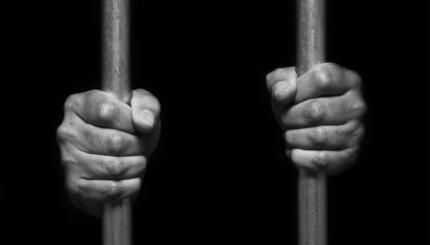“I don’t want your Paradise, I don’t want your World to Come, I want only You—You alone.” —Rabbi Schneur Zalman of LiadiThis desire to hold and be held by unending love permeates my weeks. The foresight of an exciting future remains a weak flickering dream on the back burner of the present. The grandeur of fame and fortune has been long ago replaced by the all-too-familiar coldness of rock bottom. And now, amidst the isolation and shame from a couple poor choices and harsh consequences, the real priority is tugging at our heartstrings.
“I just want God to see me now.”
See, I too, hear echoes of the Altar Rebbe yearning to cling to God alone, but I don’t need to wander through the depths of the wilderness to see this kind of faith. I don’t need to seclude myself from the hustle of day-to-day life or the pain of human suffering; on the contrary, I must immerse myself in it. My hitboddedut has a unique zip code: The Lehigh County Department of Corrections. Four times a week I surround myself with communities of men and women who have traded their Paradise for jail sentences and Worlds to Come for therapy and prescriptions to get them through the present. On Mondays and Thursdays when I sit in a circle with seventeen women of all ages, races, and backgrounds, we lean on one another as we share in both the simple joys and uphill obstacles with heavy hearts.
I facilitate conversations about faith and spirituality, my soft-covered purple Tanakh in my grasp as though it held the solutions to mass incarceration and systemic racism and sexism behind bars. It does not. In the confines of the white walls of the recreation room, women in a sea of beige share stories of their kids and parents, laugh at their childhood dreams, and cry openly and freely. Coming from mostly Protestant upbringings, these women use the safe space rules to angrily put God on trial alongside them, challenging their theologies to see them through their varying times in jail. At the end of every evening we spend together—without fail— we share our prayers. My Tankah is passed around and post-its of prayers and names of loved ones are folded into the pages of Tehillim. We link arms and pray for one another out loud, only using the spontaneous thoughts and feelings that enter our hearts. Amens for healing, successful court hearings, improved relationships echo throughout the small room, but one particular wish always ignites intense applause: Prayers to know God more. To increase their faith and decrease their worldly fears.
The month of Elul encourages us to decrease ourselves and cling to the Beloved in our lives, be it God, a partner, friend, or all of the above. What R’ Schneur Zalman illustrates as the “King in the Field,” Elul is a month of deep transcendent love and “bittul,” or the suspension of the self, in order to fully elevate the Beloved in whom your love dwells. We do not simply exist for ourselves. This letting go in order to cleave to another epitomizes Elul’s famous acronym, Ani L’Dodi V’Dodi Li, I am for my beloved and my beloved is for me. Give all of ourselves— the baggage we carry, choices we make, and dreams we have built and lost—to a source of love in your life. It is the second two words of this phrase that must become the paradigm in our communities this year—v’dodi li. The love that we are pouring into this world has every opportunity and right to be reciprocated, not despite our journeys, but because of them. There are women in jail whose teshuvah has moved mountains in both their relationships with their families and their faith, but would probably not offer them seats inside our shuls or around our tables. As this community of women in jail uniforms and numbered tags prepare to undergo bittul and suspend themselves for the sake of those who have isolated them in the past, may our hearts be open to love and be loved just as vulnerably. May both halves of Elul’s wholeness be observed in our communities, for we deserve to have God see us for who we are now, rather than for the marks we have missed.
This fellowship of women has become a davening (praying) space for me, holy ground on which all of our feet can rest firmly, regardless of where they have walked. For this Chassidic master of Liadi, his fixation on God enabled him to hold the suffering of others. For this spiritually-seeking college senior, my involvement in the pain and vulnerability inside jail fixes my eyes on the One who creates consolation in this broken world.
Elul
Pronounced: eh-LULE, Origin: Hebrew, Jewish month usually coinciding with August-September.



